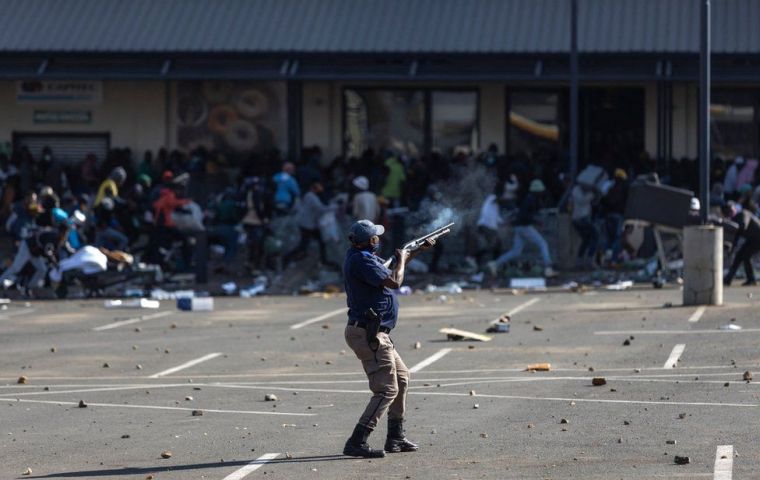MercoPress. South Atlantic News Agency
Riots in South Africa since last week leave at least 72 dead
 ”What we are seeing now are acts of opportunistic criminality,” Ramaphosa said
”What we are seeing now are acts of opportunistic criminality,” Ramaphosa said South Africa has been since last week going through a wave of riots and looting which has already left 72 people dead and 1,234 detainees, it was reported Tuesday.
The Government has needed to bring both the Police and the Army to join forces to stabilize the affected areas where vandalism and violence have reached levels never seen before in the democratic history of the country.
Gangs have raided shopping centres and stores, burned vehicles and buildings and blocked streets and highways in the eastern province of KwaZulu-Natal and also in the province of Gauteng, where Johannesburg and Pretoria are located.
What began as protests over the imprisonment of the controversial former president Jacob Zuma (2009-2018) for judicial contempt, has grown into a wave of looting and indiscriminate vandalism of a magnitude that the country's president, Cyril Ramaphosa, compared to the troubled transition in the early 1990s, after the end of the “apartheid” segregation system.
“The path of violence, looting and anarchy only lead to more violence and devastation. It leads to more poverty, more unemployment and more loss of innocent lives. This is not who we are as a people,” Ramaphosa lamented in a broadcast message.
By 9 pm Tuesday local time, the death toll stood at 72, with 45 dead in Gauteng and 27 in KwaZulu-Natal, according to the South African Police, which also confirmed a total of 1,234 arrests.
The situation during the day was kept out of control at many points due to the chaotic influx of people, even despite the deployment of 2,500 soldiers to support the Police, which had been completely overwhelmed by the altercations both Tuesday and in previous days.
”The looting continues, so I cannot say that (the situation) is under control,“ admitted the head of the Gauteng government, David Makhura, in statements to the press.
South African Security Minister Bheki Cele had stressed that ”no discontent or personal circumstances“ gave ”the right to anyone to loot, vandalize and do whatever they want and break the law.“
Cele, who in recent days was the target of harsh criticism for the inability of the security forces to anticipate and handle the wave of vandalism, also warned that the many affected by the incidents - both personally and materially - should not take justice into their own hands.
South African authorities appealed to the communities and social leaders so that the civil society is organized to prevent and discourage looting and violence.
The incidents began last Friday in KwaZulu-Natal, the home province of controversial former president Jacob Zuma, who on June 29 had been sentenced to 15 months in prison for judicial contempt after having repeatedly refused to testify for corruption.
Although the former president surrendered peacefully to the authorities last Wednesday, Zuma had previously insisted that he was the victim of political-judicial persecution and that the prison sentence would be a ”death sentence“ for him.
In this context, his sympathizers went out to cut roads as a show of support. In the following days, these protests spread across KwaZulu-Natal and were replicated in other areas, especially the Johannesburg area.
But by the weekend they had already evolved onto a chaotic wave of riots, which rather than with political motives are linked to pre-existing social problems, such as extreme inequality, high crime rates and discontent over the pandemic of covid-19.
”What we are seeing now are acts of opportunistic criminality, with groups of people instigating chaos merely as an alibi to loot and rob,” Ramaphosa said.
The president has warned that the chaotic situation will impact the country's food and health security, in addition to representing a severe setback for the economic recovery and the advancement of the vaccination plan against the coronavirus.
The Ministry of Health confirmed that in the affected areas there were interruptions in immunization against covid-19, but also problems of access to other basic medical services, such as medication for diabetes, HIV or tuberculosis.
The unrest comes at the height of an aggressive third wave of covid-19 driven by the Delta variant, with some 2.2 million accumulated infections and some 64,000 deaths.




Top Comments
Disclaimer & comment rulesCommenting for this story is now closed.
If you have a Facebook account, become a fan and comment on our Facebook Page!